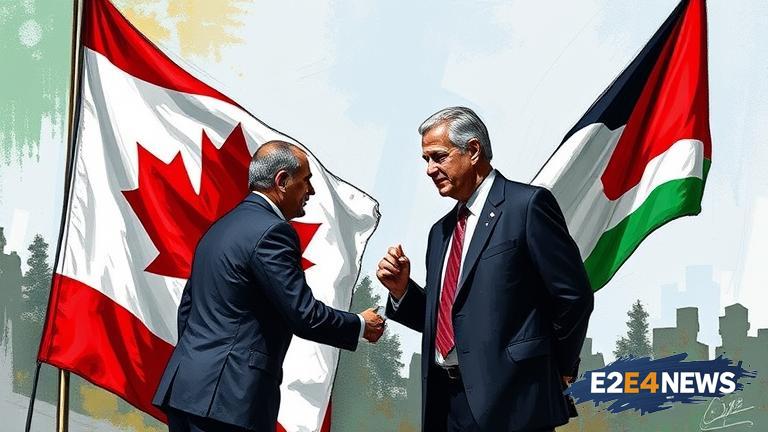Canada’s recent statement on Palestinian statehood has sent shockwaves throughout the international community, prompting a flurry of reactions from world leaders and diplomats. The announcement, which expressed support for a two-state solution, has been met with both praise and criticism. Proponents of the move argue that it is a crucial step towards achieving lasting peace in the Middle East, while opponents claim that it undermines Israel’s sovereignty. The Canadian government’s decision has been hailed as a bold move, with many seeing it as a significant shift in the country’s foreign policy. However, others have expressed concerns that it may exacerbate tensions in the region. The Palestinian Authority has welcomed Canada’s stance, viewing it as a major victory in their quest for statehood. Meanwhile, Israeli officials have expressed disappointment and frustration, arguing that the move is premature and ignores the complexities of the conflict. The United States, a key player in Middle East diplomacy, has also weighed in on the issue, with the State Department issuing a statement that acknowledges Canada’s right to its opinion while reiterating its own commitment to a two-state solution. As the debate rages on, experts are weighing in on the potential implications of Canada’s stance, with some predicting that it could lead to increased pressure on Israel to negotiate a peace agreement. Others, however, warn that it may embolden Palestinian extremists and undermine efforts to restart stalled peace talks. The European Union, which has long been a proponent of a two-state solution, has also expressed support for Canada’s position, with officials praising the country’s courage and vision. In the midst of this diplomatic flurry, the Canadian government is facing criticism from some quarters, with opponents accusing it of abandoning its traditional role as a neutral broker in the conflict. Despite the backlash, the Canadian government remains committed to its stance, with officials arguing that it is essential to finding a lasting solution to the Israeli-Palestinian conflict. As the situation continues to unfold, all eyes are on the Middle East, where the consequences of Canada’s decision will be closely watched. The international community is holding its breath, waiting to see how the situation will play out and what the ultimate outcome will be. In the meantime, diplomats and world leaders are engaged in a frenzy of activity, seeking to capitalize on the momentum generated by Canada’s statement. With the fate of the Middle East hanging in the balance, the stakes are high, and the world is watching with bated breath. The Canadian government’s move has also sparked a heated debate within the country, with some Canadians expressing pride and support for their government’s stance, while others have voiced opposition and criticism. As the discussion continues, it is clear that Canada’s decision has ignited a powder keg of emotions and opinions, both at home and abroad. The road ahead will be long and challenging, but one thing is certain: Canada’s stance on Palestinian statehood has marked a significant turning point in the pursuit of peace in the Middle East. With its bold move, Canada has thrown down the gauntlet, challenging other nations to follow its lead and work towards a lasting solution to the conflict. Only time will tell if this gamble will pay off, but for now, the world is waiting with anticipation to see what the future holds. The Middle East peace process has been stalled for years, and Canada’s decision may be just the catalyst needed to get things moving again. As the international community continues to grapple with the complexities of the conflict, one thing is clear: Canada’s stance on Palestinian statehood has marked a new chapter in the pursuit of peace and diplomacy in the region.
